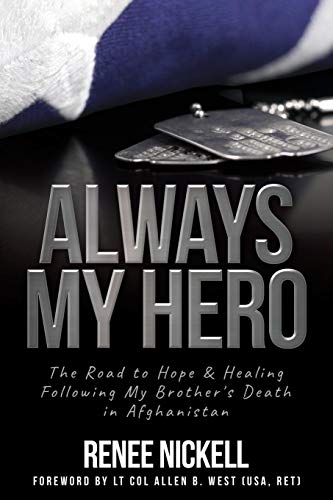A Forgotten Mourner's Faith to Fight
Author, Always My Hero: The Road to Hope & Healing Following My Brother’s Death in Afghanistan; (Lifewise Books, 2019 second edition)
Gold Star sibling
Advocate/Supporter of military service members and families, especially Gold Star families
Works with her mom and stepdad to raise support for an annual golf tournament in her brother’s memory for Renewal Coalition and service members wounded in combat
Served with an international ministry, worship ministry, youth ministry
Military wife to Gentry
Mother of four children
Homeschool mom
RENEE’S BROTHER
Renee grew up in her older brother Sam’s shadow although she didn’t mind. She was comfortable being the little sister. Her parents divorced when she was young which forged an even stronger bond between Sam and her. He was the one person she could always count on and the one she knew would never hurt her. Sam built Ford Mustangs with her father and although she loved her dad, Renee had nothing in common with him. After Sam joined the Marines, Renee went to live with her mom until she graduated from high school. She struggled with rebellion and was unsure of any significance or importance in her life. On more than one occasion, Sam helped to rescue her from some of her poor decisions. Sam went on to flight school, earned his wings, and got married. In 1999, Renee married Gentry, a military man, and started their family.
When Sam did not requalify to remain an aviator in 2006, he transitioned to the 4th ANGLICO unit in West Palm Beach, Florida. He qualified to be the Forward Air Controller where he was their eyes in the sky for bombing. In 2009, Sam deployed to Iraq. Even though he would be on the ground this time Renee wasn’t afraid because she felt Sam was invincible. His deployment went well and he returned home safely, but then he signed up for another deployment in 2011. Renee spent some time with him before his deployment to Afghanistan. She told him, “Don’t go doing anything stupid over there. You just keep your head down and come home to your family.” Sam smiled and said he loved her. She told him the same. Renee never questioned whether he would be injured and never believed he would be killed.
On December 14, 2011, she was at home when she got the call from her mom that Sam died. He was killed in combat when he relieved one of his team members and gave him a break from the previous day’s fire fight. The news devastated Renee. She screamed and cried while her twelve-year-old daughter, Kylee, took her phone and called her father about her uncle’s death. Kylee also assisted with her younger siblings and called close friends who came to their house to comfort Renee and help with the family. A few days later, Renee traveled with family to prepare for the transfer of his remains. Renee recalls, “I was unable to believe Sam was in that box.” The post-traumatic stress her family dealt with in those moments was overwhelming as they each tried to cope with the loss of Sam.
At the funeral, Renee gave the eulogy. She recalls how God gave her peace at the moment she needed most. Sam was buried at Arlington National Cemetery. His death devastated their entire family which is not uncommon for military families that experience the loss of a loved one. Renee struggled with PTSD for the next several years.
THE AFTERMATH
After four months, Renee fell into a deep depression. Sam’s death caused her to shut down mentally, emotionally, and physically for years. The depression intensified as she realized how alone she was in her grief. She became an absent mother, her marriage began falling apart as did her relationship with Kylee (who was also struggling with PTSD). Her relationship with her mom reached a breaking point. As she grieved the loss of Sam she experienced the loss of her own identity as a sister. “I lost who I was without Sam. I was never just Renee, and I didn’t know how to navigate my life or my identity without him,” shares Renee. It was during this time her relationships with her father, half siblings, and sister-in-law became strained.
Renee did not know how to work through the brokenness. One day she found herself alone at the house, she grabbed a bottle of wine and a bottle of Xanax. As she sat on her bed and contemplated taking her own life, “There was this fear inside of me that didn’t want to take that risk, but I just didn’t know how to make the pain stop,” recalls Renee. All of a sudden there was a knock at the door. Her best friend Cindy, who knew the code to the garage had let herself in and found Renee with the two bottles in hand. She took the bottles from Renee. Gentry immediately got Renee help and she was placed on antidepressants. She began to see things more clearly but now she had to work on her relationship with her mom which had been damaged in her grief. One gift she gave her mom was a wreath made from one of Sam’s old uniforms. It was very meaningful to her mom to have such a heartfelt gift. Suicide is a difficult subject especially for Christians because there is a level of shame associated with it. Renee encourages people not to pass judgement since survivors often cannot control these urges at times when dealing with that level of trauma.
HEALING
People around Renee expected her to bounce back after Sam’s death. Yet even eighteen months after his death she was still in so much pain. Desperate for a new start and a place to heal they moved to Fort Worth. She put her trust in God and let Him direct their steps. She also found out at age 40 she was pregnant with her fourth child, Maggie. After all the pain from Sam’s death Renee was thankful for God’s gift.
After years of traditional therapy methods did not seem to help, Renee came across equestrian therapy. The ranch she close had experience with combat veterans, PTSD, traumatic experiences, and many other areas of healing that military and military families could benefit from. Gentry and Kylee went to the sessions with Renee. “Three months of horse therapy typically equated to three years of traditional talk therapy,” reveals Renee. Her assigned therapist, Callie, says,” One of the benefits of this therapy is that you can see how you are feeling through the eyes of your horse, even when you may not be able to distinguish what you are feeling on the inside. It brings awareness of your feelings so you can begin to change and recognize your emotions.” Together they found the therapy helpful but ultimately had to shift the changes into their home. They had to deal with their suppressed emotions so fighting became more frequent and intense. Renee let God walk her through the healing process. During this time, she read many books on forgiveness. She knew God was with her even when she couldn’t feel Him. Renee relied on His word and not her feelings. Sam’s death could have filled her heart with hate and bitterness, but she prayed that someone’s life would be changed because of his death. Then one day she got a call from Jaime who was a friend of Sam’s and had attended his memorial service in Virginia. He said the eulogy she gave changed his walk with God. Jamie began attending church and eventually became a missionary to Africa.
GOLD STAR SIBLING
A Gold Star sibling is a brother or sister of those killed in action. When Sam died Renee felt left behind. Her brother was the one person who she had spent the most time with growing up. They remained close even into adulthood. “Siblings need our grief to be validated. We need to feel like our grief matters. We are desperate for our pain to be acknowledged just as much as our parents, spouse, and children. No one’s grief is greater than another, it is individual. It is a unique journey. Siblings are often robbed of feeling like they can grieve freely,” shares Renee.
Six years after Sam’s death, Renee decided that she wanted to write a story that would honor her brother, bring awareness to the impacts of the death of a sibling, and bring others hope and healing by the telling of her own personal journey. Renee shares, “You can heal from the death of a sibling. You can find a new normal and a new place within your family, even if it is much different than before…I am a proud Gold Star sibling. My brother died in war. I am not the same person I was before he died. I am healed, but like a missing limb, I still experience pain. I still grieve but have found joy and happiness and meaning.”
Tragedy Assistance Program for Survivors (TAPS) is instrumental in helping families of a military member who is killed in action or dies during active duty service whether by suicide or health conditions process grief. “I am forever indebted to them for the compassion they have shown our family,” shares Renee.


